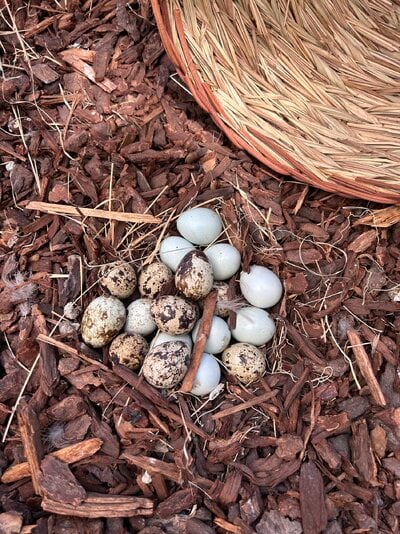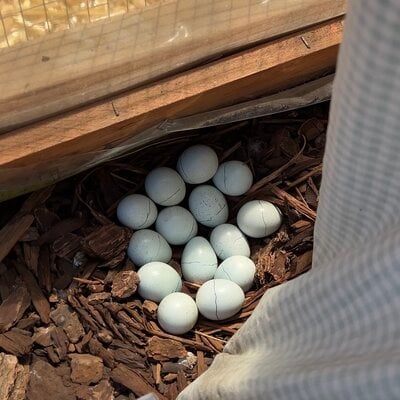I'm running a little "eggsperiment," letting eggs build up to see where the hens prefer to lay. Three other hens have gone broody in the meanwhile since my girl Janey started sitting, and I've had to break all 3 (not enough partitions for that many protective mamas). But I noticed that the hens who tend to brood are also the most likely to lay in sensible spots—next to grass, in a hut, under a log alcove. The hens who lay in different spots every day—or even out in the open—don't seem to show interest in nests in the least.
Janey, my current prospective mama, is the first committed broody I've seen (1 out of 15 observed, 1 out of 6 who I gave viable eggs to) that didn't line her nest with grass or straw. She laid a "secret" clutch of only her own eggs (she's also a celadon layer and literally kicked out every non-blue egg—birdy bigotry! ) behind a hanging shade sheet and was AWOL until I noticed the broody poops lying around. I've noticed that nesting, separate from laying tendencies, also exists on a spectrum—from well-made and insulated nests to bare substrate.
) behind a hanging shade sheet and was AWOL until I noticed the broody poops lying around. I've noticed that nesting, separate from laying tendencies, also exists on a spectrum—from well-made and insulated nests to bare substrate.
Here's the most nest-like nest I've seen so far:

Here's the under-basket clutch the other girls are collaborating on right now, note the grass they've begun lining it with:

And here's Janey's nest on Day 0—no adornment, insulation, or padding, just a depression in the bark. She'd already been sitting "empties" on it for about a week:

Takeaway: This all leads me to think that A) broodiness involves multiple (likely heritable) tendencies related to nest-building and egg-laying behavior, and if so B) we might be able to select for broody tendencies and breed them into a line of quail by observing hens' laying/nesting fitness. The girls who lay "safer" clutches in more carefully-tended nests could also be the ones with the biological gumption to brood and mother chicks.
My problem is I keep no males—no way to test this out, at least for this year's season. But I encourage you (those whose setups and purposes allow) to let your eggs go uncollected—with a handful of hens, it would only take a week to amass a clutch or two and observe nesting behavior (if present). Everybody seems to think broodiness was bred out of Coturnix—why couldn't we breed it back in?
That's all. Thanks for coming to my TED Talk.
Janey, my current prospective mama, is the first committed broody I've seen (1 out of 15 observed, 1 out of 6 who I gave viable eggs to) that didn't line her nest with grass or straw. She laid a "secret" clutch of only her own eggs (she's also a celadon layer and literally kicked out every non-blue egg—birdy bigotry!
 ) behind a hanging shade sheet and was AWOL until I noticed the broody poops lying around. I've noticed that nesting, separate from laying tendencies, also exists on a spectrum—from well-made and insulated nests to bare substrate.
) behind a hanging shade sheet and was AWOL until I noticed the broody poops lying around. I've noticed that nesting, separate from laying tendencies, also exists on a spectrum—from well-made and insulated nests to bare substrate.Here's the most nest-like nest I've seen so far:

Here's the under-basket clutch the other girls are collaborating on right now, note the grass they've begun lining it with:

And here's Janey's nest on Day 0—no adornment, insulation, or padding, just a depression in the bark. She'd already been sitting "empties" on it for about a week:

Takeaway: This all leads me to think that A) broodiness involves multiple (likely heritable) tendencies related to nest-building and egg-laying behavior, and if so B) we might be able to select for broody tendencies and breed them into a line of quail by observing hens' laying/nesting fitness. The girls who lay "safer" clutches in more carefully-tended nests could also be the ones with the biological gumption to brood and mother chicks.
My problem is I keep no males—no way to test this out, at least for this year's season. But I encourage you (those whose setups and purposes allow) to let your eggs go uncollected—with a handful of hens, it would only take a week to amass a clutch or two and observe nesting behavior (if present). Everybody seems to think broodiness was bred out of Coturnix—why couldn't we breed it back in?
That's all. Thanks for coming to my TED Talk.

